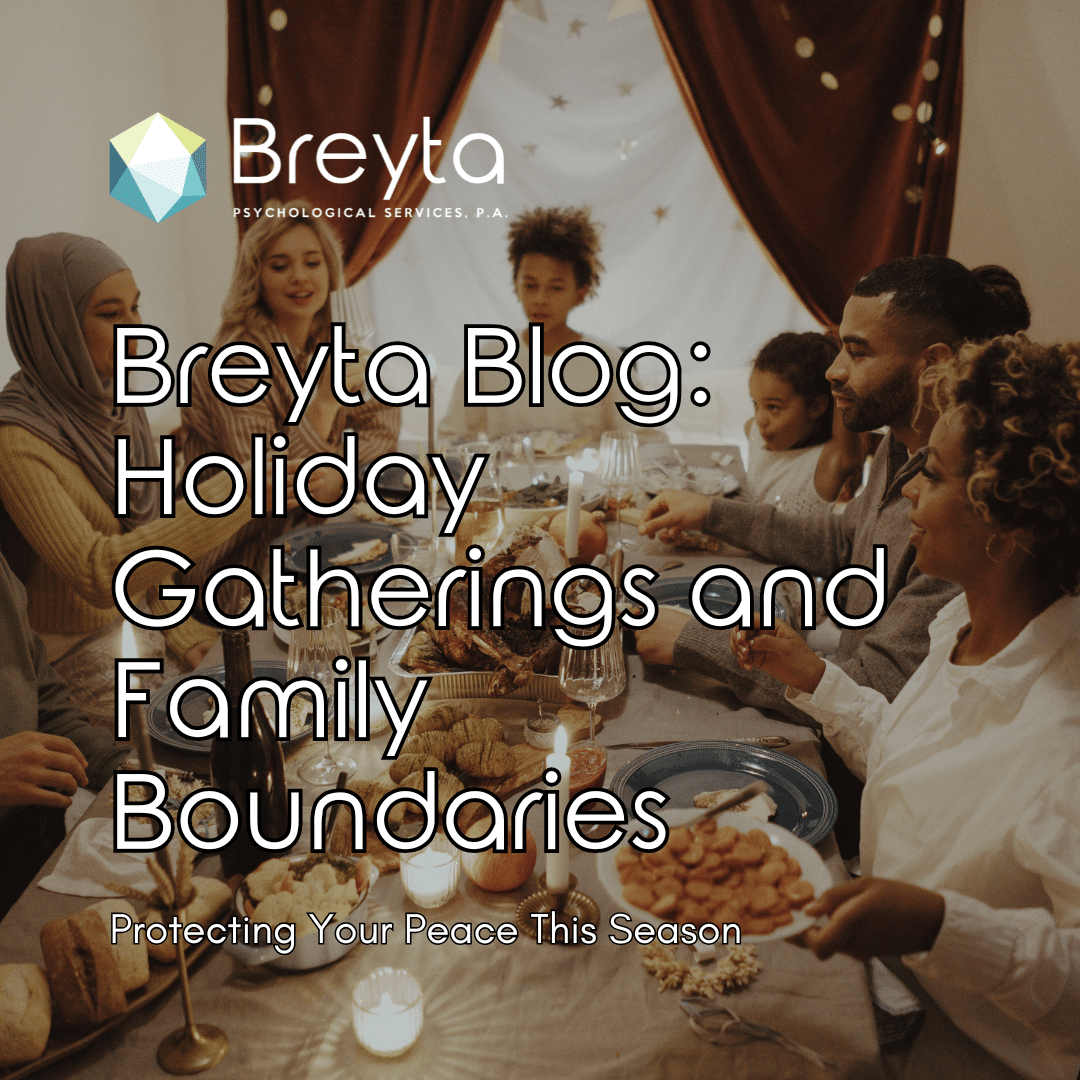by Emily Rowe, Psy.D.
The holiday season is often portrayed as a time of joy and connection, but for many, it can bring up a difficult mix of emotions. This is especially true when gatherings require you to navigate significant differences in personal values with relatives or loved ones. These dynamics can become more isolating when differing viewpoints lead to heightened tensions, making it more important than ever to protect your mental and emotional well-being.
If you are struggling this holiday season and don’t know how to navigate difficult family dynamics while remaining true to your values, you aren’t alone. Many people are facing similar struggles. In this post, I’ll review a few pointers to consider during the holiday season, especially during a time of societal tension.
1. Understand Boundaries as Self-Care
Reflecting upon personal boundaries and ways to implement them can support you through the mix of emotions that might arise during family time. Sometimes boundaries involve distancing yourself from specific people in your life, but more generally, boundaries are about finding ways to connect while protecting your emotional health.
Setting boundaries might mean deciding which topics are off-limits for discussion, such as making a plan to disengage from discussions about specific political, religious, or cultural topics. Remember: even if you hold your values strongly, you are not obligated to defend your perspectives or disclose them to those who may not respect them.
Some relatives may seek out conflict or tend to “stir the pot.” In these cases, consider using neutral, non-engaging responses that shut down additional conversation on that topic, such as “I see,” “I hear what you’re saying,” “I understand that’s how you feel,” “that’s one way to look at it,” or “I don’t have anything to add to that.” Feel free to use a “broken record” technique—repeat your boundary calmly and consistently until the message is clear. You can also physically remove yourself from unproductive interactions: take a bathroom break, walk around the block, find a new person to chat with, help with cleanup, or even leave the gathering altogether if needed.
Remember: even if someone else is unhappy with your boundary, you have the right to define what you need for your own peace and emotional health. You do not owe anyone a rationale for your beliefs or your boundaries.
2. Prepare for Challenging Conversations
If you’ve made the decision to attend holiday gatherings with people who might have conflicting values, it can be helpful to think ahead about how to handle difficult interactions. Reflect on your intention beforehand—such as “I will go to this holiday dinner because I want to enjoy time with loved ones and value our traditions. I can enjoy these aspects while maintaining my boundaries.” While you cannot control others’ behavior, you can control your response. Preparing a phrase like “I just want to enjoy time with everyone, so I’d rather not dive into that topic right now” can be helpful. You can also use humor to redirect the conversation if appropriate.
3. Lean on Coping Strategies
Navigating tricky family dynamics can easily cause emotional exhaustion. Consider ways to stay grounded and connected with your values despite potential conflict, such as deep breathing, taking a break to call or text a friend, or even going for a quick walk outside. These practices can lower stress levels and make it easier to respond thoughtfully rather than react emotionally. If available, identify someone at the gathering who you feel comfortable with—someone who can provide support or act as a buffer during tense moments.
4. Honor Your Values
Clarifying your values can help you stay grounded during trying times. Journaling or reflecting on what matters most to you can be reaffirming, especially if you need to hold back with loved ones to protect your peace. While disengaging or redirecting conversations is a valid option, there may also be moments when speaking up aligns with your values. Standing up for what you believe can be empowering, but it’s important to be realistic about the potential outcomes in family gathering settings. Broader contextual factors often have more influence on others’ opinions than any individual conversation, and these conversations may not lead to the change you hope for. Consider your emotional bandwidth and whether others might be receptive to your perspectives before deciding how to proceed.
It is also okay to decrease or omit time with specific family members if being around them feels frustrating or distressing. You have the right to choose an alternative plan if family gatherings feel unhealthy or unsupportive. If the expressed beliefs or behaviors of relatives are likely to harm your mental health, you might decline the invitation entirely. Balancing personal values and emotional health with cultural or family traditions looks different for everyone. In some cases, creating new traditions with supportive others can be a meaningful way to protect your well-being.
5. Make Space for Self-Compassion
It’s important to recognize that navigating family dynamics is inherently difficult—especially when values conflict. Give yourself grace as you move through this holiday season. Practicing self-compassion can be as simple as affirming that you’re doing your best to balance connection with emotional health.
If you feel disempowered or unable to meaningfully connect with family members, consider engaging in personally meaningful action to show compassion to others in the broader community. Connect with advocacy organizations or volunteer groups aligned with your values—whether through signing up for in-person service or joining online communities. Reaching out to others who might be feeling the same way can provide validation and opportunities for mutual support. You can honor your values through action while also protecting your peace by choosing when and with whom to engage.
6. Seek Support When Needed
Sometimes the emotional toll of navigating family dynamics can feel too heavy to manage alone, especially during uncertain times. You may notice that issues related to setting boundaries or interacting with family members this year may feel overwhelming. Therapy can provide a safe and supportive space to process painful experiences, connect with your values, empower yourself with effective boundaries, and develop personalized strategies for difficult situations.
The holiday season is often a reminder of what we cherish—love, celebration, and belonging. By connecting with your personal values, establishing healthy boundaries, and making space for compassion, you can create an experience that honors both yourself and those you care about. If this information resonates with you and you’re looking for more personalized support, I would be honored to help. Together, we can explore ways to navigate these dynamics and make space for your full self and the connections that matter most.
Schedule your appointment with Dr. Emily Rowe today she specializes in family-of-origin issues, estrangement, identity, and trauma; all issues that feel more salient at the holidays. To schedule a consultation or first session, just email [email protected].





